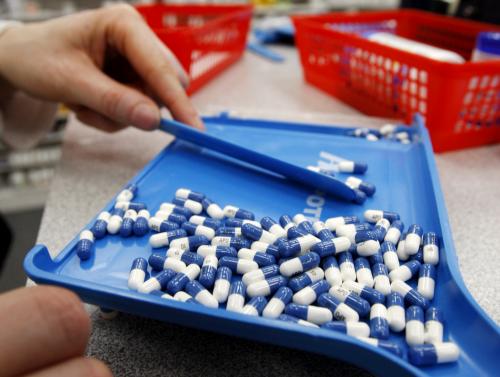Louisiana recently implemented an arrangement under which a subsidiary of Gilead Sciences will supply—for a fixed sum—enough drugs over the next five years to cure virtually all incarcerated and Medicaid beneficiaries suffering from Hepatitis C. Rebekah Gee, Secretary of the Louisiana Department of Health; Neeraj Sood of the Schaeffer Center for Health Policy and Economics and Price School of Public Policy, both at USC; Rena Conti of Boston University’s Questrom School of Business; Rekha Ramesh, Executive Director of Public Policy at Gilead Sciences; and Wendell Primus, Senior Policy Advisor to House Speaker Nancy Pelosi (D-CA) came to the Hutchins Center on Fiscal and Monetary Policy at Brookings to discuss the Louisiana program. Here are some highlights of the conversation. (You can watch the full video or read the transcript here.)
About 20,000 people a year were dying from Hep C, Sood says he learned when serving on a National Academies of Sciences panel in 2015. That’s more than the combined death toll of 60 other infectious diseases tracked by the Centers for Disease Control. And there’s an existing cure for this disease: take a pill for 12 weeks, and you no longer have it. But few people in Medicaid or in prisons with Hep C were getting those pills.
There are (at least) three alternatives to the unaffordable option of the state buying all the drugs that are required at the going market price, Sood explains.
Louisiana, essentially, is using the modified subscription model. Gee explains the state’s motivation—to save lives—and its approach.
Louisiana is one of the poorest states in the U.S. How was it able to implement such an ambitious plan? Gee reflects on the help her team received from the Centers for Medicare and Medicaid Services (CMS), private foundations and academics, and how they were able to bring together various interest groups and have a productive conversation with pharmaceutical companies.
Given that Louisiana is a poor state, it could never have afforded to buy enough of the Hep C drugs to treat everyone on Medicaid or in prison. One option, Gee recalls, was to invoke a rarely used federal statute, Section 1498 of the federal patent law.
What made Louisiana’s modified subscription model attractive to Gilead? Gilead (which does have some competition for its Hep C drug) is now the exclusive supplier of the drug to the state, has a predictable and steady source of revenue, and is making at least as much profit (and probably more) than it was before—but treating more people.
Conti says that the Louisiana initiative demonstrates that while existing health policies—such as Medicaid best price (a policy requiring drug manufacturers to give Medicaid programs the best price among nearly all purchasers) and the 340B drug discount program (a discounted drug pricing program for hospitals and clinics that cover vulnerable individuals)—are here to stay, there is still room for innovation.
Primus praises Rebekah Gee and the state of Louisiana for their achievements and their commitment to public health. However, he says new treatments coming onto the market will “challenge state budgets,” so federal policy will have to change.
Primus says that House Democrats are contemplating a plan to curb high drug prices without hampering innovation by giving the Secretary of Health and Human Services the authority to negotiate prices on certain drugs for Medicare and Medicaid, the largest buyers for prescription drugs.
You can watch the full video or read the transcript here.






Commentary
Louisiana’s innovative drug purchasing program, and what it could mean for the country
September 4, 2019